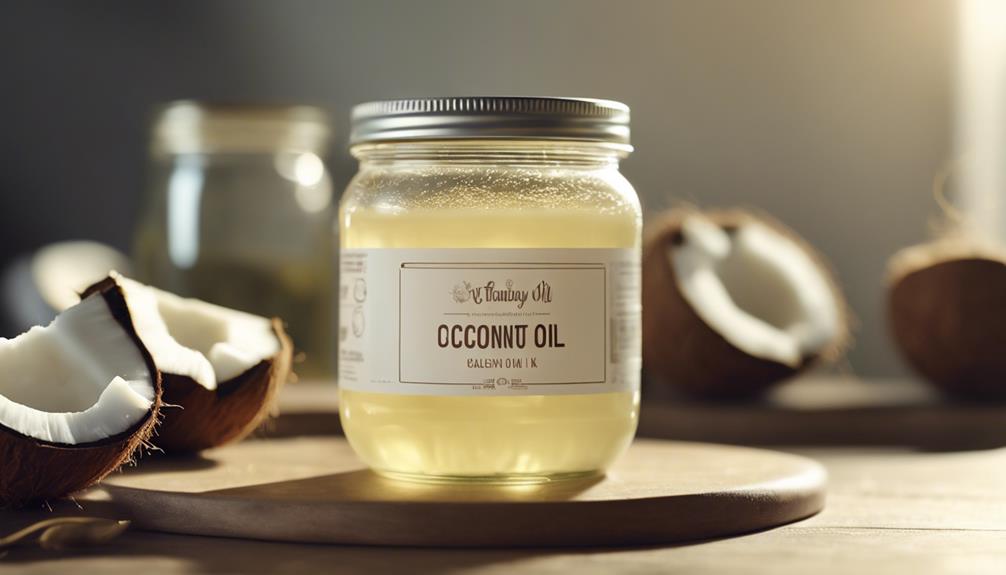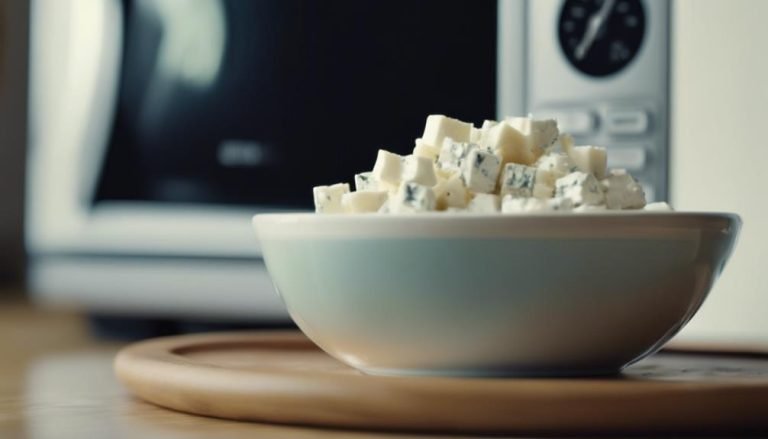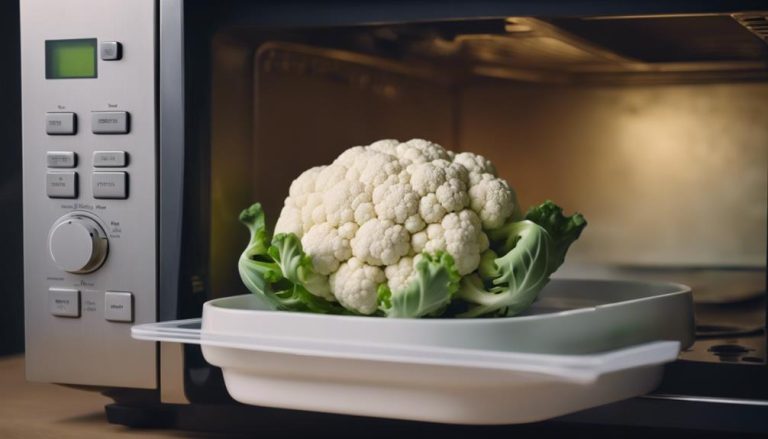Can You Microwave Coconut Oil
Yes, you can microwave coconut oil. However, it is important to exercise caution and follow best practices to avoid altering its composition. Use a microwave-safe container and heat the oil in short intervals, stirring in between, until it reaches the desired consistency.
Keep in mind that excessive heat can degrade the nutritional properties of coconut oil, so it's best to use low to medium power settings and avoid overheating. By microwaving coconut oil correctly, you can conveniently melt solidified oil without compromising its benefits and culinary applications.
Key Takeaways
- Microwaving coconut oil requires caution to prevent overheating and nutrient loss.
- Use short intervals and stir for even heating.
- Consider alternative methods like a double boiler for controlled melting.
- Avoid direct heat sources to maintain oil quality and beneficial properties.
Safety of Microwaving Coconut Oil
When microwaving coconut oil, it is important to prioritize safety due to the potential risks associated with overheating and sparking. Coconut oil, being an oil, has a lower specific heat capacity than water, making it easier to overheat in a microwave.
To ensure safety, it is recommended to microwave coconut oil in short intervals and stir in between to distribute the heat evenly. Additionally, using a lower power setting and covering the oil while heating can help prevent popping and potential accidents.
Removing water content by refining fats can also eliminate popping when microwaving coconut oil, further enhancing the safety precautions that should be taken when using this method of heating.
Effects on Nutritional Properties
Microwaving coconut oil can potentially impact its nutritional properties, particularly through the risk of overheating and subsequent degradation of beneficial nutrients and antioxidants. When heating the oil, it's crucial to be mindful of the process to preserve its health benefits. Here are some effects on nutritional properties to consider:
- Loss of Health-Promoting Compounds: Excessive heat, especially when using a microwave, can lead to the breakdown of essential nutrients and antioxidants present in warm coconut oil.
- Changes in Carbon Chain Structure: Prolonged or intense heating can alter the carbon chain structure of the oil, potentially diminishing its nutritional value.
- Potential Nutrient Degradation: Overheating may result in the loss of key nutrients, impacting the overall nutritional profile of the coconut oil.
Best Practices for Microwaving

To ensure the preservation of nutritional properties while microwaving coconut oil, it is essential to follow best practices that prioritize gentle heating and careful monitoring of the oil's temperature.
When microwaving coconut oil, it is advisable to melt it in short intervals, typically for a few seconds at a time, to prevent overheating and potential burns. Stirring the oil between intervals is crucial to ensure even heating and prevent hot spots.
Additionally, using a microwave-safe container is essential for safe melting. To avoid sparking, which can occur if the oil is overheated in the microwave, consider alternative methods like a double boiler or a hot water bath for a gentler melting process.
Tips for Heating Coconut Oil
Consider utilizing gentle heating methods to effectively warm coconut oil for optimal results. When heating coconut oil, it is crucial to avoid overheating to maintain its beneficial properties.
Here are some tips for heating coconut oil safely:
- Heat oil in a double boiler: This method allows for controlled heating and prevents the oil from getting too hot too quickly.
- Use a hot water bath: Placing the container of coconut oil in hot water helps melt it gradually without the risk of overheating.
- Avoid direct heat: Direct heat sources can cause the oil to heat unevenly, potentially damaging its quality and nutrients.
Common Misconceptions About Microwaving

One prevalent misperception regarding the use of microwaves with coconut oil pertains to its potential for mishandling heat distribution. Some individuals assume that all oils, including extra virgin coconut oil, can be heated in the microwave to melt them quickly. However, coconut oil has a low specific heat capacity compared to water, making it prone to overheating. When users try to melt coconut oil in the microwave, they may not realize that its molecules absorb microwave radiation differently than water molecules, leading to uneven heating and the risk of burns or sparking. To debunk this misconception, it's crucial to handle coconut oil with care and consider safer alternatives like melting it in hot water rather than risking overheating in the microwave.
| Misconception | Fact |
|---|---|
| All oils can be heated in the microwave | Coconut oil has a low specific heat capacity compared to water |
| Microwave is the quickest way to melt coconut oil | Coconut oil molecules absorb microwave radiation differently than water molecules |
| Overheating coconut oil is harmless | Overheating can result in burns or sparking |
| Stirring is unnecessary when microwaving coconut oil | It's recommended to microwave in short intervals and stir in between |
| Microwaving coconut oil is the best method | Consider melting coconut oil in hot water instead |
Frequently Asked Questions
Can Microwaving Coconut Oil Cause It to Lose Its Natural Fragrance?
Heating methods play a crucial role in preserving the natural fragrance of coconut oil. Microwaving at high temperatures can lead to the evaporation of essential aroma compounds, impacting its original scent profile. Opt for gentler heating methods to retain the aromatic benefits in skincare and aromatherapy.
Will Microwaving Coconut Oil Affect Its Texture or Consistency?
The heating process of coconut oil through microwaving can induce texture changes due to temperature fluctuations, impacting its consistency. Such modifications are reversible, maintaining the essential properties of the oil, demonstrating the influence of cooking methods on oil properties.
Is It Safe to Use a Plastic Container to Microwave Coconut Oil?
Using a plastic container to microwave coconut oil is not safe. It can lead to overheating, sparking, or burns. Opt for microwave-safe glass or ceramic containers. Adjust heating time, power levels, and stir periodically for even melting.
Can Microwaving Coconut Oil Alter Its Antioxidant Properties?
Microwaving coconut oil may compromise its antioxidant properties, risking nutrient loss and flavor alteration. The heating process can induce molecular changes, affecting health benefits and shelf life. Opt for gentle methods to ensure antioxidant preservation and maximize health benefits.
How Long Can Microwaved Coconut Oil Be Stored for Before It Goes Bad?
The shelf life of microwaved coconut oil is influenced by storage methods. Proper airtight containers in cool, dark places can extend freshness up to 6 months. Monitor for rancidity signs regularly, considering temperature, humidity, and refrigeration needs.
Conclusion
In conclusion, microwaving coconut oil can be safe and convenient if done correctly.
By following best practices, such as using short intervals and stirring, you can avoid potential risks and maintain the oil's nutritional properties.
Remember to be cautious with the container used and explore alternative methods for a gentler approach.
Keep these tips in mind to ensure a successful and safe experience when heating coconut oil.






